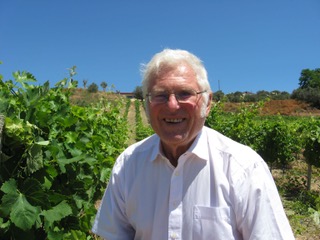A regular contributor to The Circular, Jochen Erler got in to wine writing while living in England, after a career in academia and the international civil service. He has written for Harpers and many other London-based wine publications, and has been the foreign correspondent for Austria’s WeinBau, as well writing for various German wine magazines. Nowadays, he writes for Dionysos, the magazine of South Tyrol’s Sommelier Association. He recalls his journey from drinking the vinegary ‘Elbe Essig’ wine in his native Dresden to following fine wine.
What are your earliest memories of wine?
As a 12-year-old, I supported gatherings with my friends with wine from my father’s wine cellar. He never noticed.
Growing up in East Germany, what was the wine like?
The local wine in Dresden was called ‘Elbe Essig’ (lit. vinegar of the River Elbe) because the wine on the market was really acidic due to a lack of ripeness. The few good vintages were reserved for the Russians and collaborators.
How did you get into wine writing?
From childhood on I wrote poetry at first, then travel reports. My studies led me to international law, to become a research assistant at McGill, and an assistant professor in California. My dislike of ‘publish or perish’ generated my shift from academia to the international civil service – UN, OECD and the European Weather Centre. After retirement I combined hiking- and ski-tour guiding with my love of wine and became a leader of wine-walks, a freelance wine writer and finally a wine lecturer.
How long have you been covering wine and how have you witnessed the wine trade and wine writing change in that time?
One of my best friends in New York was the commercial attaché of the French Embassy. He invited me to the wine tastings for Trade & Press of wine importers and diplomatic missions. Also through attending tastings organised by Les Amis du Vin and the Sommelier Society, I got to know the market well and became an occasional wine consultant to diplomatic missions.
To explain the change in the wine trade since then requires a whole page: New World, Old World; ABC movement; barrique-ageing and wine styles; wine journals without funds for freelancers…
Having been specialised in wine tourism, how long do you expect it to take wine tourism to fully recover from the Covid pandemic?
That’s difficult to predict. It depends also on the efforts by the wine and tourist industry in generating demand for such travel.
All tour operators and wineries lost customers, wine tourism was practically dead. If wine was sold ex-cellar, it was to local customers.
What new trends can you see coming up in wine tourism? What do you think are the next wine tourism hotspots?
Upcoming countries with rare varieties and vineyards with pre-phylloxera vines.
What upcoming regions do you have your eye on? Which ones would you like to visit this year?
Kazakhstan and Moldova. Kazakhstan because one of its wineries won the highest award for its Pinot Noir at the Mondial des Pinots in Sierre, Switzerland, where I was judging. Moldova because last year it won most of the medals in an international wine contest in Poland.
What do you do to relax in your free-time? Do you combine your love of thermal spas with wine?
I like to spend my free time outdoors. When on a spa vacation, I always visit wineries nearby, those in Villany in southern Hungary are my favourites.
What wines are you currently enjoying?
Wines from an ascending small organic producer in the Palatinate, Michael Andres. They are all 2019s – a Spätburgunder (Pinot Noir) and two Rieslings.

